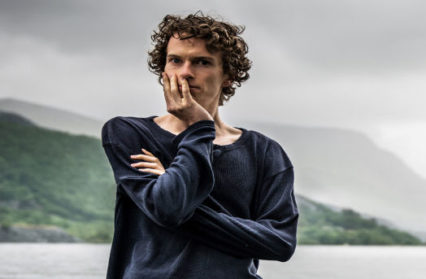Emily Garside visited the Chapter Arts Centre in Cardiff to watch and review a performance of My Body Welsh by Tara Robinson and Steffan Donnelly.
The story of a tall skinny Welshman, a skeleton. And a lot of water.
Tara Robinson and Steffan Donnelly create a world in which one Tall Skinny Welshman (Steffan Donnelly) explores the nature of Welshness, Wales and the history and story from ancient times to more recent tall tales in the village. It’s a broad and sweeping piece of work that takes in everything from the Welsh Dragon on the flag, to a comment about current political climates, to village life and national pride, young love and everything in between. Its fast paced delivery at times with seeming non-sequiturs lurching across the time and space of Welsh mythology, it still feels an incredibly personal, and despite some element of in-joking, a charmingly universal tale.
It is a tale that draws on myths and legends of Wales, and those that could belong anywhere. Some of them big and sweeping like the ancient Celtic Myths on which Wales has built much of its culture. Others are less unique but still betray the quirky nature of its inhabitants – like that of the industrious shopkeeper who made up the longest place name in wales for more business. The tales Donnelly weaves rely on this tradition of the mythical, and pokes and prods at the idea of how the tall tales relate to the idea of Welshness. He moves close to criticism, but never quite commits, staying within something of a bubble of a certain brand of Welshness.
With the genre of the monologue performance being a well-trodden (if often effective) one, the approach that Steffan Donnelly and Tara Robinson take with My Body Welsh is an effective one. Welcoming the audience to Chapter’s performance space, stopping for a chat with various audience members as they enter – fair warning in fact that the audience will not be passive in weaving this tale. Then Donnelly sets up his brand of storytelling – a fireside chat-style delivery that itself is reminiscent of Welsh storytelling tradition. After introducing himself properly to the audience as ‘Tall, skinny and Welsh’ Donnelly begins his tale.
Using a combination of water, microphone, his own voice and the voices of willing audience members, Donnelly creates a myriad of soundscapes as a backdrop to the stories. Mixed and managed live by Jordan Mallory-Skinner, everything from a dog whistle to the sounds of a lake are woven out of the simplest noises and equipment. It’s this sheer innovation that lifts My Body Welsh to another level in performance. It’s rarer to see a piece which innovates with form while also having such a tightly-weaved narrative performance. The effects are enchanting and endlessly fascinating but they never eclipse the story, only serve it. It’s a real strength of innovation from Donnelly.
He asks, ‘There’s more to being Welsh than having the accent, isn’t there?’ and over the course of an hour proves that yes, there most certainly is. But My Body Welsh does seem to be about a Welshness that doesn’t – pardon the expression – necessarily translate. This doesn’t entirely refer to the bilingual nature of the piece, which is woven together wonderfully and feels organic and natural. The dialogue is arranged as such that when Donnelly switches from Welsh to English and back again a narrative point is never dropped, but doesn’t feel repeated only for the sake of translation, more as part of the pacing, integral to the story. What does get lost in translation, however, is a world of humour (some of it spoken in Welsh, some not) and references that don’t seem to transcend the more rural Welsh-speaking origins of its roots. For those not brought up in the traditions of Eisteddfod and Welsh village life, elements of My Body Welsh are not the shared experience the writers hope it to be.
However, this discord works in favour of the point they seem to be making. Wales, Welsh identity, the Body Welsh (singularly and as a nation) is much more than the accent. It’s more than the Eisteddfod getting cancelled or keeping the English Salmon fishers out. And most importantly, it’s no single entity, no single story. The idea of Welsh identity, the body Welsh, is as open to interpretation as many of the tales told. What matters more is that people tell these tales, that people consider that identity.
My Body Welsh is a cleverly written piece of storytelling, that links that very tradition back to the nation it is talking about. In a week when a Welsh University bore the brunt of The Daily Mail’s wrath for appointing a Professor of Storytelling, it’s timely perhaps to remind Wales how important storytelling is to history and culture and even in these digital and difficult times, important to retain in our identity. The mixture of weaving old legends with new stories in the tightly written piece, contemporary references with legends, Welsh language alongside English, allows My Body Welsh in form as well as content, to capture the idea of what is Welsh – in exactly that, it’s many contradictions.
Emily Garside contributes regularly to Wales Arts Review.












